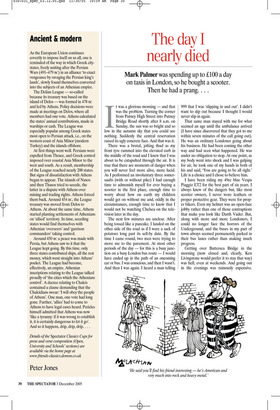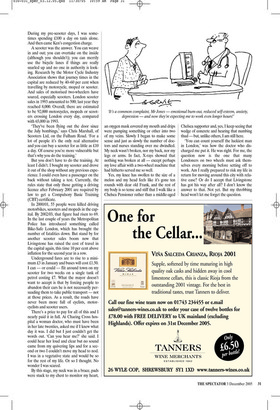The day I nearly died
Mark Palmer was spending up to £100 a day on taxis in London, so he bought a scooter. Then he had a prang....
It was a glorious morning — and that was the problem. Turning the corner from Putney High Street into Putney Bridge Road shortly after 8 a.m. on Sunday, the sun was so bright and so low in the autumn sky that you could see nothing. Suddenly the central reservation raised its ugly concrete face. And that was it.
There was a brutal, jolting thud as my front tyre rammed into the elevated curb in the middle of the road and I knew that I was about to be catapulted through the air. It is true that there are moments of danger when you will never feel more alive, more lucid. As I performed an involuntary three somersaults (with or without pike) I had enough time to admonish myself for ever buying a scooter in the first place, enough time to worry about how on earth my children would get on without me and, oddly in the circumstances, enough time to know that I would not be watching Chelsea on the television later in the day.
The next few minutes are unclear. After being tossed like a pancake, I landed on the other side of the road as if I were a sack of potatoes long past its sell-by date. By the time I came round, two men were trying to move me to the pavement. At most other periods of the day — for this is a busy junction on a busy London bus route — I would have ended up in the path of an oncoming car or bus. I was conscious, and then I wasn’t. And then I was again. I heard a man telling 999 that I was ‘slipping in and out’. I didn’t want to slip out because I thought I would never slip in again.
That same man stayed with me for what seemed an age until the ambulance arrived (I have since discovered that they got to me within seven minutes of the call going out). He was an ordinary Londoner going about his business. He had been coming the other way and had seen what happened. He was under no obligation to stop. At one point, as my body went into shock and I was gulping for air, he took one of my hands in both of his and said, ‘You are going to be all right.’ Life is a choice and I chose to believe him.
I have been riding my 49cc blue Vespa Piaggio ET2 for the best part of six years. I always knew of the dangers but, like most scooter owners, I never wore leathers or proper protective gear. They were for proper bikers. Even my helmet was an open-face jobby rather than one of those contraptions that make you look like Darth Vader. But, along with more and more Londoners, I could no longer face the horrors of the Underground, and the buses in my part of town always seemed permanently parked in their bus lanes rather than making much progress.
Getting over Battersea Bridge in the morning (now closed and, clearly, Ken Livingstone would prefer it to stay that way) was hell, even at weekends. And going out in the evenings was ruinously expensive. During my pre-scooter days, I was sometimes spending £100 a day on taxis alone. And then came Ken’s congestion charge.
A scooter was the answer. You can weave in and out; you can overtake on the inside (although you shouldn’t); you can merrily use the bicycle lanes if things are really snarled up and no one in authority is looking. Research by the Motor Cycle Industry Association shows that journey times in the capital are reduced by 40–60 per cent when travelling by motorcycle, moped or scooter. And sales of motorised two-wheelers have soared, especially scooters. London scooter sales in 1993 amounted to 500; last year they reached 8,000. Overall, there are estimated to be 92,000 motorcycles, mopeds or scooters crossing London every day, compared with 65,000 in 1993.
‘They’ve been flying out the door since the July bombings,’ says Chris Marshall, of Scooters Ltd, on the Fulham Road. ‘For a lot of people it’s the only real alternative and you can buy a scooter for as little as £10 a day. Of course you’re more vulnerable but that’s why you do the training.’ But you don’t have to do the training. At least I didn’t. I bought my scooter and drove it out of the shop without any previous experience. I could even have a passenger on the back without taking a test. Currently, the rules state that only those getting a driving licence after February 2001 are required by law to get a Compulsory Basic Training (CBT) certificate.
In 2000/01, 55 people were killed driving motorbikes, scooters and mopeds in the capital. By 2002/03, that figure had risen to 69. In the last couple of years the Metropolitan Police has introduced something called Bike-Safe London, which has brought the number of fatalities down. But stand by for another scooter sales boom now that Livingstone has raised the cost of travel in the capital again, this time 10 per cent above inflation for the second year in a row.
Underground fares are to rise to a minimum £3 in January and buses will cost £1.50. I can — or could — flit around town on my scooter for two weeks on a single tank of petrol costing £7. What the mayor doesn’t want to accept is that by forcing people to abandon their cars he is not necessarily persuading them to take public transport — not at those prices. As a result, the roads have never been more full of cyclists, motorcyclists and scooter users.
There’s a price to pay for all of this and I nearly paid it in full. At Charing Cross hospital a woman doctor, who must have been in her late twenties, asked me if I knew what day it was. I did but I just couldn’t get the words out. ‘Can you hear me?’ she said. I could hear her loud and clear but no sound came from my quivering lips and for a second or two I couldn’t move my head to nod. I was in a vegetative state and would be so for the rest of my life. Or so I thought. No wonder I was scared.
By this stage, my neck was in a brace, pads were stuck to my chest to monitor my heart, an oxygen mask covered my mouth and drips were pumping something or other into two of my veins. Slowly I began to make some sense and just as slowly the number of doctors and nurses standing over me dwindled. My neck wasn’t broken, nor my back, nor my legs or arms. In fact, X-rays showed that nothing was broken at all — except perhaps my love affair with a two-wheel machine that had hitherto served me so well.
Yes, my knee has swollen to the size of a melon and my head feels like it’s gone ten rounds with dear old Frank, and the rest of my body is so tense and stiff that I walk like a Chelsea Pensioner rather than a middle-aged Chelsea supporter and, yes, I keep seeing that wedge of concrete and hearing that numbing thud — but, unlike others, I am still here.
‘You can count yourself the luckiest man in London,’ was how the doctor who discharged me put it. He was right. For me, the question now is the one that many Londoners on two wheels must ask themselves every morning before setting off to work. Am I really prepared to risk my life in return for moving around this city with relative ease? Or do I accept that Livingstone has got his way after all? I don’t know the answer to that. Not yet. But my throbbing head won’t let me forget the question.




























































 Previous page
Previous page